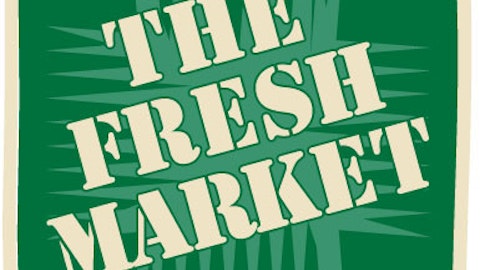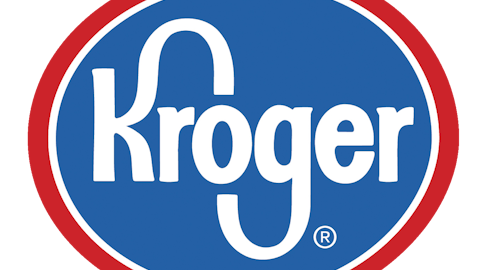Last month, I interviewed Whole Foods Market, Inc. (NASDAQ:WFM) co-founder and co-CEO John Mackey in front of a live studio audience at Motley Fool headquarters. Mackey recently published Conscious Capitalism: Liberating the Heroic Spirit of Business with co-author Raj Sisodia, and he stopped by our Alexandria, Va., offices on his book tour.
The core of their book is that businesses must move away from the so-called “Friedman doctrine,” which posits that the sole aim of a business is to create value for its investors.

Brian Richards: The prevailing narrative of American capitalism has really been the Friedman doctrine, which is basically that shareholder value is the be-all and the end-all of a company. You mention early in the book that Milton Friedman is an intellectual hero of yours, even though you pretty vehemently disagree with him on this point.
This book is a treatise on why that is wrong and what should replace it. So tell us, why is Friedman wrong?
John Mackey: Well, I wouldn’t quite put it that way, but one way to think about it is that Gallup shows that the reputation of big business in America now has dropped down to a 19% approval rating. That means 81% of the people do not really approve of big business. It’s got a terrible brand. It’s seen as selfish and greedy and exploitative. The narrative has been captured by the critics and the enemies of business, the enemies of capitalism. And yet business has been the greatest value creator in the world, as we point out in the first chapter — we show how humanity has been lifted up by business and by capitalism in the last 200 years.
Two hundred years ago, 85% of the people alive lived on less than one dollar a day — today’s dollars. Today, that’s down to 16%. Over 90% of the people alive 200 years ago were illiterate. Today, that’s down to 14%. The average lifespan 200 years ago was only 30. Today, it’s 68 in the world, 78 in the United States. And business and capitalism are largely responsible for this and don’t get credit for it, but it’s true nevertheless.
And so, in the United States now we see 7.9% unemployment; it’s even higher than that if you count all the people that stopped looking for work. We’ve got the GDP per capita and the per-capita income has declined in the past 10 years. I think that’s the first time in American history you’ve seen a 10-year decline. We also saw economic freedom in decline in America that, as little as the year 2000, the economic freedom index had the United States ranked No. 3 behind Hong Kong and Singapore. Now we’ve fallen all the way down to No. 18, and as economic freedom declines, so does our prosperity. They’re directly related, because … the greater economic freedom you have, the more prosperous the nation. There are really no exceptions to that.
So business has a bad reputation. It’s seen as selfish and greedy. Economic regulations are going up. We have a high-tax society now. People don’t trust business — I don’t know how many people saw the documentary called The Corporation that came out a few years ago. That basically portrayed business and corporations as a bunch of sociopaths out there, ready to rape and pillage and exploit people at every opportunity they get, dump their waste products in rivers, and basically, [operate as] really bad actors.
So you talk about the Friedman doctrine, well, that’s what everybody’s come to believe — the purpose of business is to maximize profits and shareholder value — and we’re losing economic freedom, we’re seeing our economic prosperity start to decline. And it’s because that’s very bad marketing. Basically, trying to justify yourself strictly on the amount of money you produce is a very bad idea. I mean, consider the fact that doctors are very well compensated in our society, right? Is the purpose of doctors to make money? Is that why they exist? Why do they exist? To heal people.
Teachers educate. Architects design buildings. Engineers construct things. Journalists, theoretically — I like to tease a journalist about this — should be to uncover the truth and not spin things, not sensationalize things. But every other one of our professions adheres to some type of purpose that goes beyond just maximizing their own gain.
Now, business is the greatest value-creator not just for a few people, but it creates value for everyone that exchanges with it; everybody trades voluntarily, so it creates value for its customers, it creates value for employees, it creates value for suppliers, it creates value for investors, and it creates value for these communities that we’re part of. So business is fundamentally good.
It can be better — we’ve written a book to talk about how business can be more conscious and, in a sense, go from good to great. But I disagree with Mr. Friedman on this particular issue because I think he’s wrong, A, and B, as a result of everybody thinking about business this way, we’re seeing business’s reputation decline, so I think it’s bad branding.
Also, I just don’t think it’s true. I’ve known hundreds of entrepreneurs who have created businesses, including your two founders of this organization, and, with very few exceptions, none started their businesses primarily to just make as much money as possible. It’s not that they don’t want to make money; it’s just that most entrepreneurs are on fire. They want to do something in the world, they want to change things, they want to have a dream realized, and so they have a higher purpose beyond just making money. It’s only the critics and a few economists that want to reduce business back to strictly being just about money.
The article How to Change Capitalism’s Declining Reputation originally appeared on Fool.com.
Fool.com managing editor Brian Richards owns shares of Whole Foods Market, as does The Motley Fool. The Fool also recommends Whole Foods Market.
Copyright © 1995 – 2013 The Motley Fool, LLC. All rights reserved. The Motley Fool has a disclosure policy.



